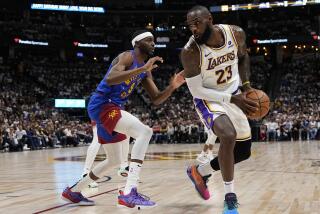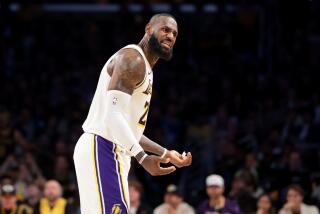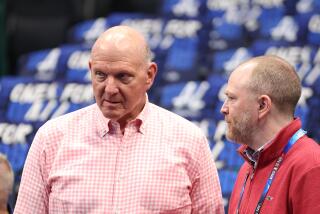It’s Now or Closer to Never for NBA
Crunch time.
Sometime in December, the NBA and its players will either make the deal they could have a month ago or visit a calamity upon their careers, franchises and game.
Since I like this job and would like to go back to earning my hotel points, I have some advice for the principals.
To “Easy” Dave Stern, commissioner, NBA:
Lighten up.
Let’s face it, pleading poverty was transparent, based as it was on the old television deal, rather than the new one which is paying teams an extra $13 million annually.
The NBA has a legitimate concern to ensure the entire $13 million isn’t handed to the Stephon Marburys and Allen Iversons. Getting the union to accept restraints hasn’t been easy but it has been accomplished, in principle, if not yet in an agreement.
The NBA has established an enviable place in TV’s firmament: it delivers young viewers and networks don’t have to mortgage themselves to afford the rights, a la the NFL. Stern, the sly fox, is asking the union for a seven-year deal, by which time he’ll be three years into the next TV contract, which promises to be a lot larger than this one.
The current impasse centers on a backup plan for the escrow proposal in the event salaries--which everyone agrees will be inhibited, if not capped--rise above 63% or 64%. Even with the old, unfettered Larry Bird exception, salaries were only 57%.
In other words, they’re arguing over a scenario that may never arise.
Unlike the current union theme song, I never believed Stern wants to break the union. He’s too smart for that, he knows he needs it to enable him to keep turning the crank on his money machine.
However, Stern’s preparations--getting NBC and Turner to sign off and make payments, locking players out, demanding give-backs--was inevitably interpreted by the union as massing troops on its border. Of course, the union and its new friend, David Falk, kicked off this round of hostilities by girding for war too.
Skirmishing is one thing but if the millionaires actually torch the season, they should all be institutionalized. They have a starry future but it depends on maintaining their present niche--which depends on playing this season. The alternative is beyond contempt or sanity.
To William Hunter, director, National Basketball Players Assn. Dear Billy: Wake up.
There’s a difference between the union you hear about, which consists of the band of hawks who have seized control, and the membership, most of which dreams of peace but finds itself voiceless and powerless.
The hawks are led by Falk and union counsel Jeffrey Kessler, the insurgents who turned themselves into the establishment. In the best tradition of the legendary Joe Hill, who supposedly told followers before he was hung, “Don’t mourn, organize,” they followed their humiliation in the 1995 decertification drive--which crashed by a 62-38 vote--with a bloodless coup, packing the leadership with Falk clients: President Patrick Ewing, directors Alonzo Mourning, Juwan Howard and Dikembe Mutombo.
Throw in Michael Jordan, who jets in occasionally to hurl down some gauntlets, and you have a union led by the Dave Falk Five, which averages almost $20 million a season.
You may wonder how a few stars can out-vote the 40% or so who made $1 million or less last season and don’t have contracts for this one, but that’s the NBA for you.
Stern reportedly recently complained to a coach that the stars are running the union.
Said the coach: “Now you know what we go through all the time.”
The revenue split, the escrow proposal and the Bird exception are stars’ issues. The low-end guys just want higher minimums and an “average salary” exception for an extra $2.5 million player. The negotiations--and the breakdowns--have been on stars’ issues, which have been pushed to the top of the agenda.
They’re on the stars’ schedule too.
Take Mourning. He has lost more than $3 million--which means instead of being on a seven-year, $105 million deal, he’s only on a $102 million deal. Like he’ll notice.
If a low-end player dissents, as Washington’s Tim Legler did, he’s shouted down. When Legler ripped the stars running the union in the Washington Post (“They’re the ones who are going to feel it if we sign this deal, that’s why the deal is not being signed”), the entire body massed to protect its prized “solidarity.” Teammates like Mitch Richmond refuted Legler and his own agent, Warren Lagarie, was soon noting that Tim had been criticizing both sides.
In fact, you hear a lot about the private anguish of the low-end players. Their agents have been griping privately for weeks about their dilemma: do they go public--and get slammed for breaking solidarity themselves--or just write an angry letter to Hunter? So far, they’ve stayed quiet.
To date, Hunter has been a disappointment to those of us who saw him as tough and independent enough to cut his own deal.
Of course, Hunter is surrounded by hawks like Kessler and the Falk marionettes, so once Falk moved his pieces into action, the degree of difficulty multiplied.
Somehow, the negotiating process keeps straining forward, although every time they make some progress, the union’s hawks jump the process anew, saying they didn’t understand some proposal or disavowing some agreement.
However, as skies have darkened, the union hasn’t gone back to threatening decertification. Hunter has signaled he doesn’t like the antitrust option and seems to be keeping his forces focused on playing this season.
That’s one for Hunter, but he’s going to have to do better than that. They all will.
More to Read
Go beyond the scoreboard
Get the latest on L.A.'s teams in the daily Sports Report newsletter.
You may occasionally receive promotional content from the Los Angeles Times.










